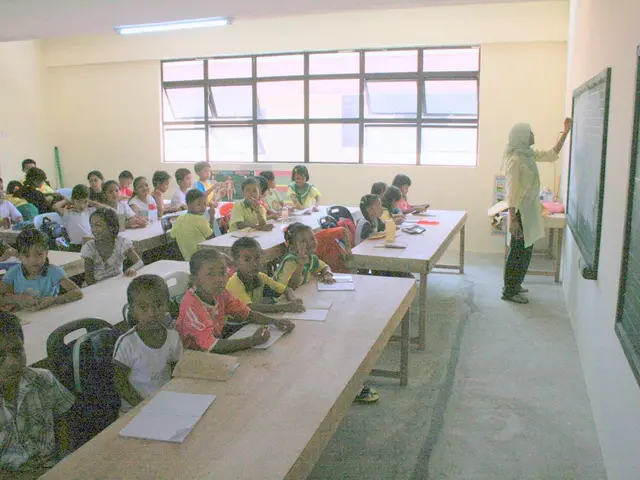A Fresh Take on Gentle Parenting Discipline: Empathy, Respect, and Nurturing Growth
Strategies for Effectively Implementing Peaceful Child Discipline
Navigating the turbulent seas of parenting can be both perplexing and rewarding. Champion a gentler path, one marked by kindness, empathy, and a flourishing environment, with gentle parenting discipline. This amazing approach turns traditional authoritarian methods upside down, replacing them with the power of understanding and compassion. Dive in as we guide you through the ins and outs of gentle parenting, enlightening you on its core concepts, benefits, and practical applications.
What is Gentle Parenting Discipline?
Welcome to the world of gentle parenting, a child-rearing philosophy rooted in empathy, respect, and positive communication that replaces the antiquated "because I said so" mindset with a dynamic coexistence where children are accepted as individuals with thoughts, needs, and feelings of their own. This approach encourages kids to voice their emotions without fear, nurturing a profound connection between parent and child.
The Core Principles of Gentle Discipline
At the heart of gentle discipline lies mutual respect. It acknowledges that while parents set boundaries and guidelines, children deserve an atmosphere of understanding and recognition for their emotions. Key principles include empathy, positive reinforcement, consistency, and fostering a nurturing connection. Instead of reprimanding, gentle discipline seeks to educate, helping kids grasp the consequences of their actions.
The Distinction Between Gentle Discipline and Permissive Parenting
A widespread misconception is that gentle parenting inevitably results in lackluster child-rearing marked by a free-for-all environment devoid of boundaries. This isn't accurate! Gentle discipline offers boundaries, albeit with a gentle approach. Unlike permissive parenting, which is rife with a lack of structure, gentle discipline provides a balanced framework in which our little ones feel secure and respected.
Why Choose Gentle Parenting Discipline?
The rewards of gentle parenting discipline are astounding, benefiting both children and parents alike. Nurturing environments foster emotional intelligence, self-esteem, and resilience in children. For parents, it encourages a meaningful relationship with their child, reducing angst and conflicts, transforming parenting into a gratifying experience.
Gentle Discipline, Emotional Intelligence, and Beyond
Cultivating self-awareness and empathy toward others lies at the core of gentle parenting. Through open dialogues about feelings, kids become more astute at deciphering their emotions and those of others. This newfound emotional intelligence infuses them with skills to manage emotions constructively, enabling them to form more harmonious connections in life.
The Long-Term Effects on Child Development
The breadth of gentle parenting impacts stretches into adulthood. Children raised under its umbrella boast stronger relationships, improved communication skills, and unparalleled empathy, translating into adaptability, problem-solving skills, and an unquenchable thirst for positive actions prompted by understanding and empathy, rather than fear of punishment.
Building Empathy: The Foundation of Gentle Discipline
Empathy serves as the bedrock of gentle parenting. Understanding a child's viewpoint empowers parents to respond with understanding, bolstering trust and a sense of security, causing children to reciprocate with empathy as they mature. Inspire your child through empathy.
Fostering Positive Communication with Your Child
The efficacy of effective communication cannot be overstated in gentle parenting. This encompasses active listening, giving your child undivided attention and acknowledging their feelings, irrespective of their triviality. Strive to talk with, rather than at, your child, using language that fosters connection rather than shame and guilt.
The Indispensable Role of Boundaries in Gentle Parenting
Boundaries stand indispensable in every parent-child relationship, but gentle parenting doesn't abandon these rules. Rather, boundaries are strengthened in a loving atmosphere. Clearly defined boundaries set the foundation for a sense of security, helping children perceive and adhere to expected behaviors, while also being positioned to feel seen and valued.
Encouraging Respectful Behavior without Fear
Gentle parenting replaces fear-based obedience with respect-driven cooperation. As opposed to punishing undesirable behavior, parents exuding gentle discipline elucidate why a behavior is inappropriate, focusing on fostering better choices. Respect becomes a two-way street, fostering an environment in which both you and your child feel valued.
Practical Techniques for Applying Gentle Discipline
Invoking Natural Consequences to Teach Responsibility
As opposed to imposing arbitrary penalties, gentle parenting urges the consideration of natural consequences. If a child insists on refusing to wear a coat in cold weather, they'll learn the hard way about the necessity of proper clothing. This strategy encourages personal responsibility by connecting actions with logical outcomes.
Redirecting Behavior Instead of Punishing
Redirecting involves guiding your child's attention away from negative actions to positive alternatives. If your child begins to hurl blocks, encourage them to construct a tower instead. This method reframes the focus around what your child can do as opposed to what they cannot, gently decreasing frustration and nurturing cooperation.
The Impact of Time-In vs. Time-Out
Instead of banishing a child for discipline, gentle parenting employs a "time-in." This strategy brings your child near and offers comfort, helping them process their feelings, as opposed to isolating them from you. In the face of criticism, maintain a loving and nurturing approach.
Positive Reinforcement, a Powerful Tool
Positive reinforcement means celebrating effort, not just achievements. Praising specific actions like, "I love how you shared your toys with your friend," champions desirable behaviors, encouraging children to continue making positive choices.
Addressing Common Challenges in Gentle Parenting
Dealing with Tantrums in a Gentle Manner
Tantrums are a universal stage of childhood, often signaling a child's struggle with big emotions. Gentle parenting views tantrums not as misbehavior, but as a call for help. Parents should stay calm, offer tenderness, and help the child navigate their emotions, guiding them towards better self-regulation.
Handling Defiance and Power Struggles
Defiance is frequently due to a child feeling disempowered. Instead of confronting it as disobedience, gentle parenting pursues the root cause. Offering choices and involving children in decision-making reduces power struggles by granting them a sense of control and autonomy.
Managing Sibling Conflicts with Empathy
Sibling rivalry is unavoidable, but it offers an opportunity to cultivate empathy and conflict resolution skills. Opposing perspectives call for careful negotiation rather than taking sides or enforcing punishments. Help siblings express their feelings, listen attentively, and encourage a collaborative effort to find a solution that satisfies everyone.
Mastering Public Meltdowns Peacefully
Public meltdowns can seem daunting, but gentle parenting takes a calm approach. Stay composed, go to your child's level, offer reassuring words, and take them away from sources of overstimulation. Keep your focus on your child's needs, not the judgments of passersby.
- In the realm of gentle parenting, kids voice their emotions freely, cultivating a profound connection with their parents based on empathy and respect.
- By understanding a child's viewpoint, parents are empowered to respond with empathy, fostering trust and a sense of security, encouraging reciprocal empathy in children.
- Effective communication is key in gentle parenting – active listening, acknowledging feelings, and avoiding shame and guilt foster greater understanding between parent and child.
- Boundaries are indispensable in gentle parenting, fostering a sense of security and positioning children to feel seen, valued, and guided towards expected behaviors.
- In gentle discipline, natural consequences teach personal responsibility, while redirecting behavior and employing "time-in" instead of isolation reduce frustration and promote cooperation.
- Gentle parenting helps tackle challenges such as tantrums, sibling conflicts, and public meltdowns by viewing these as calls for help, offering tenderness, and engaging with empathy and problem-solving skills instead of punishment.








